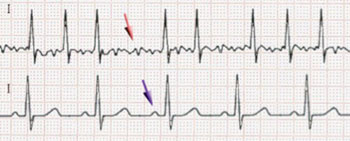Blood Test Based on Genetic Biomarkers Detects Atrial Fibrillation
By LabMedica International staff writers
Posted on 16 Oct 2014
Heart disease researchers have developed a DNA-based blood test that identifies individuals with atrial fibrillation and predicts likelihood of suffering ischemic stroke.Posted on 16 Oct 2014
Atrial fibrillation (AF) is the most common abnormal heart rhythm. It may cause no symptoms, but is often associated with palpitations, fainting, chest pain, or congestive heart failure. The cause of an individual's AF may not be identified. The risk of stroke is increased five-fold in individuals with AF. AF may be identified clinically when taking the pulse and its presence can be confirmed with an electrocardiogram (ECG) that demonstrates the absence of P waves and an irregular ventricular rate. AF may occur in episodes lasting from minutes to days or may be permanent in nature. Many medical conditions increase the risk of AF, in particular mitral stenosis (narrowing of the mitral valve of the heart).

Image: ECG of atrial fibrillation (top) and normal sinus rhythm (bottom). The purple arrow indicates a P wave, which is lost in atrial fibrillation (Photo courtesy of Wikimedia Commons).
Investigators at Lund University (Sweden) examined the possibility that genetic biomarkers could be used to detect AF. To this end they created an AF genetic risk score (AF-GRS) based on twelve genetic variants (single nucleotide polymorphisms or SNPs) in the human genome that were linked to increased risk of atrial fibrillation.
The investigators evaluated samples from In 27,471 participants of the Malmö Diet and Cancer Study, a prospective, community-based cohort, to assess the association of AF-GRS with incident AF and ischemic stroke. Median follow-up was 14.4 years for incident AF and 14.5 years for ischemic stroke.
During the follow-up period, 2160 participants experienced a first AF event and 1495 had a first ischemic stroke event. Participants in the top 20% of AF-GRS were at increased risk for incident AF and ischemic stroke when compared with the bottom 20%. Patients who had already been diagnosed with atrial fibrillation and carried the panel of 12 SNPs had their risk of stroke increased by a further 70%–80%.
"One in five people have a genetic weakness that means they have twice as high a risk of developing atrial fibrillation as those with a low genetic risk. This genetic risk is therefore one of the strongest risk factors for atrial fibrillation that we know of in people without overt cardiac disease. It increases the risk as much as high blood pressure, for example", said senior author Dr. Olle Melander, professor of internal medicine at Lund University. "In patients who are suspected of having temporary but recurrent episodes of atrial fibrillation, or in people with high blood pressure, it can be important for doctors to look at their genetic predisposition using a blood test. The test can give guidance as to how often and how intensively doctors need to screen for presence of atrial fibrillation in these individuals. We also consider that more widespread treatment of high blood pressure may be justified in those with a high genetic risk of atrial fibrillation."
The study was published in the October 2014 issue of the journal Stroke.
Related Links:
Lund University












.jpg)
